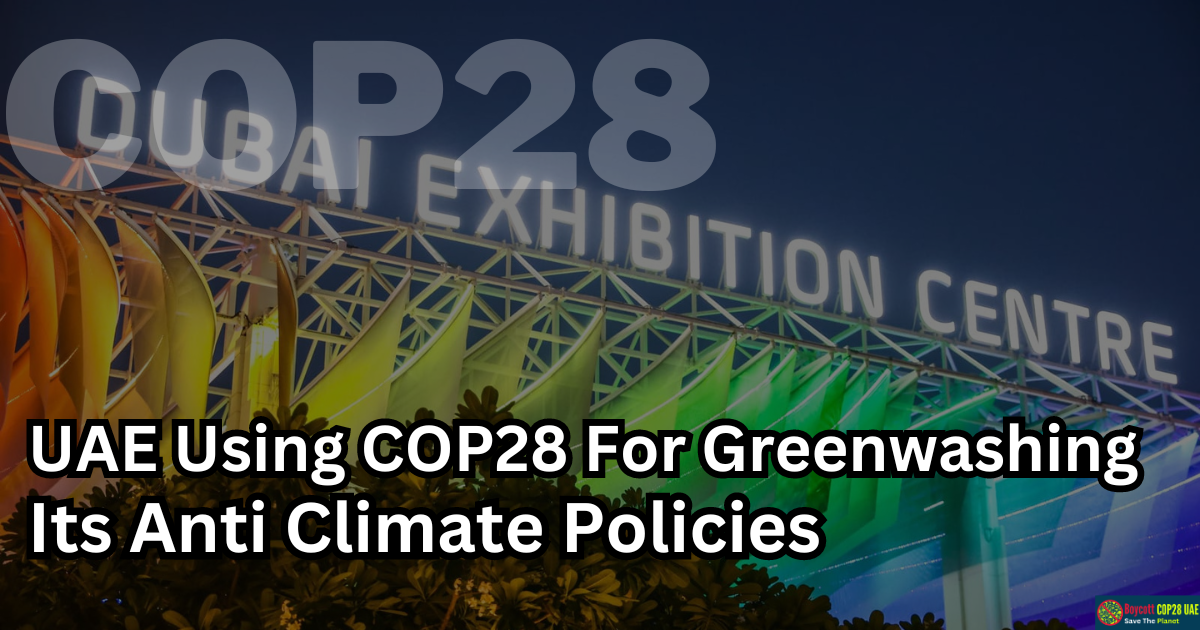The upcoming COP28 is going to be held in Dubai soon. Dubai is a country that is known for its luxury lifestyle and modernization. The United Arab Emirates (UAE) is gearing up to host the 28th Conference of the Parties (COP28) to the United Nations Framework Convention on Climate Change. As the worldwide leaders gather into a single place to discuss the different issues related to climate change. A unique angle emerges, casting a critical eye on how the UAE may be leveraging COP28 for what some critics call “greenwashing” and its anti-climate policies.
Greenwashing is the term that is used to elaborate the wrong message to all other nations. The UAE misled the people by showing that they had serious concerns about the climate crisis. But in reality, they just want to increase their oil production and use this crucial event to present themselves as champions of sustainability on the international stage.
The United Arab Emirates, with its ambitious modernization and different types of new development projects, has faced criticism in the past because this country is heavily dependent upon fossil fuels. The oil-driven economy of this nation has played an essential role in carbon emissions. This raises serious questions about the United Arab Emirates’ climate commitment. As COP28 is very near, it is essential to note that the UAE is concerned about this event or if it serves as a strategic move to divert attention from its less-than-green policies.
The center stage of the discussion is the apparent dissonance between the UAE’s modern infrastructure projects and its climate objectives. The country has announced plans to invest in renewable energy and reduce carbon emissions but has not discussed when they take these steps. They just want to mislead other nations with its sweet talk but do not take serious action.
One of the focus goals is to shed light on the continued expansion of oil and gas projects in the UAE.
Despite worldwide calls to move away from fossil fuels and different oil productions, the country has continuously invested in the extraction and production of oil. Critics argue that the UAE’s commitment to hosting COP28 may be an attempt to mask these activities and present a facade of environmental responsibility.
However, The UAE government shows very little investment in renewable energy projects like nuclear power, solar cells, etc. They also shed light on the ambitious objectives set to enhance the share of clean energy in the country’s total energy mix.
Yet, skeptics question that actions speak louder than words. They also ask how much sincerity these efforts have. Because the investment of the United Arab Emirates in renewable projects is very small when compared to its oil production output. The concern is that the emphasis on green initiatives could be a strategic move to deflect attention from the carbon footprint generated by the nation’s vast oil and gas operations.
Moreover, environmental advocates of different nations argue that the UAE’s commitment to sustainable practices should extend beyond its borders. They elaborate on the United Arab Emirates’ involvement in different types of controversial projects.
As the global community gathered with the desire to reduce greenhouse gas emissions. The fear is that the United Arab Emirates may use such crucial events to showcase their commitment to environmental causes and downplay less environmentally friendly activities.
While the UAE’s hosting of COP28 provides an opportunity for the nation to demonstrate its dedication to addressing climate change, the international community remains watchful. But their actions are totally different. The nation still has an aim to increase its oil and fossil fuel projects.
Final Words
In the end, as COP28 unfolds against the backdrop of Dubai’s futuristic skyline, the world awaits to see if the UAE’s commitment to combating climate change is indeed a genuine endeavor or if it is, as critics suggest, a sophisticated form of greenwashing. Only time will tell if the conference serves as a catalyst for meaningful change or if it becomes a symbol of environmental rhetoric without substantive action.






